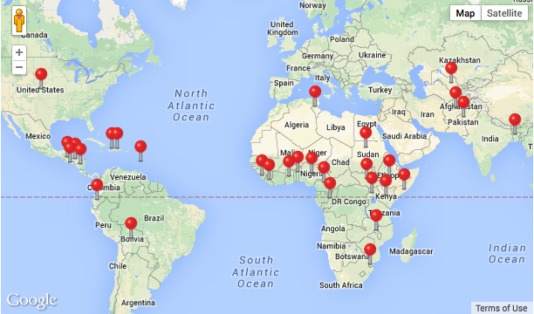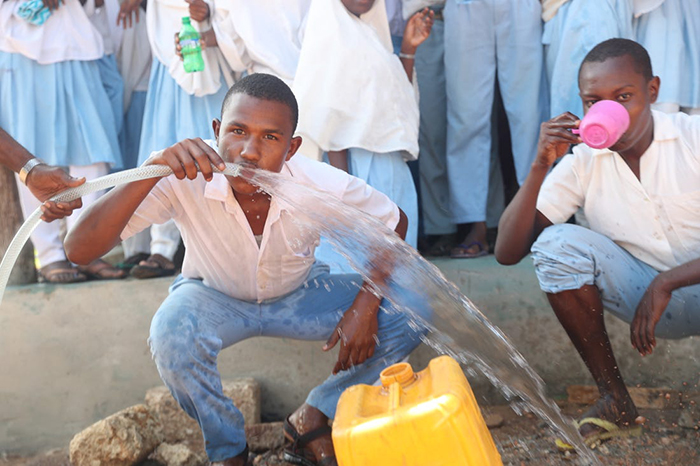- About
- Topics
- Picks
- Audio
- Story
- In-Depth
- Opinion
- News
- Donate
- Signup for our newsletterOur Editors' Best Picks.Send
Read, Debate: Engage.
| January 14, 2015 | |
|---|---|
| topic: | Health and Sanitation |
| tags: | #disease, #Ebola, #Global Soap Project, #hygeine, #soap |
| located: | USA, Uganda |
| by: | Vanessa Ellingham |
When Derreck Kayongo stayed in a hotel in Philadelphia for the first time after arriving from Uganda he was shocked to find that each night when he returned to his hotel, a fresh bar of soap awaited him, even though he’d barely had a chance to use the previous one.
The bars of soap being thrown out by the cleaning services at his hotel were just a handful of the 2.6 millions bars of soap discarded by hotels in the US every single day.
Having experienced the destruction caused by unsanitary living conditions – he and his family fled mass torture and killings in Uganda under Idi Amin – it was hard for Kayongo to understand how getting a new bar of soap each day could be justified.
In 2009 he launched the Global Soap Project with a mission to improve the global state of health by recycling discarded soaps and redistributing them to those who lack access.
Recently the Global Soap Project helped to stem the Ebola crisis in Sierra Leone, but they’ve been working to deliver soap to those in need for the last five years.
As well as redistributing soaps, the project also works with partner organisations around the world to help people understand the importance of hygiene and how to wash their hands properly. Handwashing is the project’s particular focus, as it is the single most effective way to combat diarrheal diseases – even more so that vaccines, medications and clean water initiatives.
Because of this, Global Soap Project views the provision of soap as the first line of defence: people earning less than $1 per day cannot afford soap, and when they get sick from poor hygiene, they definitely can’t afford to go to the hospital.
But if you give them soap and teach them how to use it properly, cases of diarrheal disease decrease by nearly one-half and rates of respiratory infection by about one-quarter. When birth attendants are able to wash their hands properly, the infant mortality rate drops by 19%.
The Global Soap Project’s work relies on volunteers, donations, partnerships with other NGOs and aid organisations, and, of course, hotels willing to donate their guests’ used soaps.
Soaps are collected from registered hotels, sorted into different types, and then melted down before being cut into fresh bars of soap. Most of this work is done by volunteers.
After that, the soaps are sent for laboratory testing to check for pathogens. Then the safe bars of soap are distributed by partner organisations, supported by NGOs who provide education to those receiving the soaps on how to use them and the importance of good hygiene.
So far people in 32 countries on four continents have received soap thanks to the Global Soap Project, including people in much of Sub-Saharan Africa, Central and Southern America, as well as in Afghanistan, Pakistan and Bangladesh.
The project has also delivered soap to people in need within the USA.
But the Global Soap Project isn’t so much about the process of delivering the bars of soap, but more about the lasting impact of educating people for the long-term.
“Our goal is to ensure that once people receive soap, they have access to it for the rest of their lives,” says the project director. “This means helping them understand how to use it, why to use it, and why it is worth acquiring from local sources long-term.”
“In other words, we create an immediate positive health impact that can be sustained for the rest of their lives while supporting local economies, and without creating dependence on us or free soap.”
So far their impact has been impressive. In their first four years (they’re now in their fifth), the project delivered more than 2 million bars of soap to those living without it.
At the same time, they were able to divert more than 500,000 pounds of soap from making it to the landfill.
Get involved
If you’re based in LA, California, the Global Soap Project is always looking for new volunteers to work in their soap processing facility there.
But, if not, there are others ways to get involved. A small donation goes a long way in soap – just 38 USD provides a year’s worth of soap and the primary hygiene education to 10 children.
Even shopping on Amazon.com cam help to support this worthy initiative. You can ask Amazon.com to donate a percentage of profits made from your purchases towards the Global Soap Project.
By copying the embed code below, you agree to adhere to our republishing guidelines.


